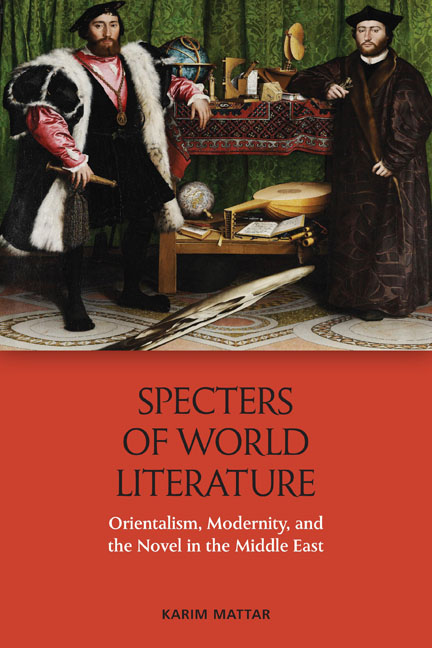Book contents
- Frontmatter
- Contents
- Preface
- Acknowledgments
- Note on Transliterations
- Introduction: Towards a Spectral Theory of World Literature
- I The Worlding of “Literature” in the Middle East
- II The Middle Eastern Novel and the Spectral Life-World of Modernity
- Conclusion: Futures of Spectrality
- Bibliography
- Index
1 - The Shabaḥ of Modernity: World-Systems, the Petro-Imperium, and the Indigenous Trace
Published online by Cambridge University Press: 20 October 2020
- Frontmatter
- Contents
- Preface
- Acknowledgments
- Note on Transliterations
- Introduction: Towards a Spectral Theory of World Literature
- I The Worlding of “Literature” in the Middle East
- II The Middle Eastern Novel and the Spectral Life-World of Modernity
- Conclusion: Futures of Spectrality
- Bibliography
- Index
Summary
The abodes are desolate, halting-place and encampment too,
at Miná; deserted lies Ghaul, deserted alike Rijám,
and the torrent-beds of Er-Raiyán—naked shows their trace,
rubbed smooth, like letterings long since scored on a stony slab;
blackened orts that, since the time their inhabitants tarried there,
many years have passed over, months unhallowed and sacrosanct.
[…]
So I stood and questioned that site; yet how should we question rocks set immovable, whose speech is nothing significant?
The Mu‘allaqa of LabidStay—Let us weep at the remembrance of our beloved[.]
The Mu‘allaqa of Imru’ al-QaisIn a recent retrospective assessment of his translation of this novel some twenty-five years earlier, Peter Theroux recounts that with the appearance of Abdelrahman Munif's Cities of Salt (Mudun al-Milḥ, 1984–9; trans. 1987–93) in Arabic and then English, “[t]he Oil Encounter was to be woven into Arab and world literature.” This sense of Cities of Salt as singular—or at least pioneering—in its engagement with oil within the domain of world literature is supported by Edward Said. Writing in 1990, he identifies it as “the only serious work of fiction that tries to show the effect of oil, Americans, and the local oligarchy on a Gulf country.” Munif was uniquely equipped to chart these effects. For in the composition of his novel, the Jordanian-born Saudi writer (whose citizenship was revoked in 1963, for political reasons) was able to draw on a lifetime of hands-on experience in the Middle Eastern oil industry. He earned a Ph.D. in Petroleum Economics from the University of Belgrade (1961); worked for the Syrian Oil Ministry for a decade (1964–73); consulted for the Organization of Petroleum Exporting Countries (OPEC) from 1975 to 1980; and, in the same period, served as editor-in-chief for the Baghdad-based monthly periodical Oil and Development (Al-Nafṭ wa al-Tanmiyya). Further, and also well before Cities of Salt, he wrote an influential politico-economic treatise—his first book—that criticized the United States’ involvement in the Gulf oil industry and called for the nationalization of this industry in especially Iraq (The Principle of Partnership and the Nationalization of Arab Oil [Mabda’ al-Mushāraka wa al-Ta’mīm al-Bitrūl al-‘Arabi, 1972]).
- Type
- Chapter
- Information
- Specters of World LiteratureOrientalism, Modernity, and the Novel in the Middle East, pp. 71 - 109Publisher: Edinburgh University PressPrint publication year: 2020



